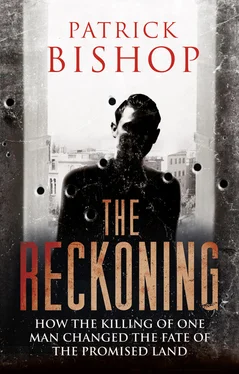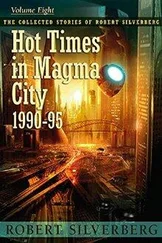The word soon spread that Giles Bey was a policeman to be trusted. This reputation attracted some surprising approaches, none more so than a communication he received at the end of 1938 from David Raziel. Raziel was in a delicate position. The Irgun were now engaged in a continuing campaign of reprisals against Arabs. At the same time, they were the main organizers of illegal immigration to Palestine, a traffic that was swelling weekly as the circumstances of Europe’s Jews grew ever more desperate. Both activities placed a burden on the Mandate’s law and order resources and attracted the unwelcome interest of the Palestine Police in the Irgun’s operations and members.
The CID played an extremely important role in the affairs of the Mandate. Its field of activities was broad and included monitoring all aspects of political life in Palestine. Its reports were crucial in determining the views of Sir Harold MacMichael and the analyses and recommendations he sent back to the Colonial Office. The department was very well informed about the machinations of established Jewish organizations. Much of the information came from friendly sources inside the Jewish Agency and the Vaad Leumi – the Jewish National Council, which represented all the main factions of the Yishuv. The authorities also engaged in systematic phone tapping from listening posts based at the Jerusalem headquarters and the CID’s four district headquarters. Yishuv organizations – and particularly the Haganah – were equally well informed about the workings of the Mandate. Jewish policemen and Jewish officials routinely passed on information to the Haganah’s intelligence service, the Shai. The Irgun’s equivalent section, Meshi, also had its moles. According to Yaacov Levstein, who became one of Stern’s most loyal lieutenants, ‘from its inception Meshi did not spare any efforts to infiltrating the CID and making use of its employees, who provided us with first-hand information on political affairs, lists of men about to be arrested, copies of various documents etc.’ 7
Raziel’s feelings towards the British were ambivalent. Unlike Avraham Stern he had not arrived at the conclusion that it was they who were the chief obstacle to a Jewish state and were therefore the Irgun’s prime enemy. Like Jabotinsky, Raziel retained the hope that, despite Britain’s anti-immigration policy and periodic appeasement of the Arabs, in the right circumstances it could still bring its weight down decisively on the side of the Jews. At the end of 1938 it seemed that the right circumstances were approaching. Another world war was looming and Britain would need all the help it could get. An offer of military cooperation might be parlayed into unequivocal support for a Jewish state. Raziel decided that the time had come to reach out to the Mandate authorities. He made his overture in a letter to Giles Bey in which he wrote that he was ‘not an enemy of Great Britain in Palestine’. Indeed, he admired British culture and believed that Britain had ‘a friendly attitude towards my people’. The Jews in Palestine were surrounded by hostile Arabs and needed the support of a European ally. The Irgun might ‘criticize the methods of the government’. But ‘we do not intend to uproot their rule’. 8
Giles’s response has not survived. However, within a few months of the letter being sent the Mandate’s policy had swung onto a new course which dealt a blow to Jews who believed in Britain’s good intentions. As 1939 dawned, war with Germany seemed not merely probable but inevitable. This realization forced a reassessment of British policy in Palestine. The Arab revolt had attracted widespread support in neighbouring Iraq, Syria and Egypt. It was vital to keep them on side in the coming fight. Two divisions of British troops who might be needed elsewhere at any minute were tied up fighting the Arabs. Some settlement would have to be found before the balloon went up.
Early in 1939 representatives from the Arab, Muslim and Jewish worlds were invited to London to settle the future of Palestine. The conference opened on 7 February in St James’s Palace and it was clear it was doomed from the start. The Arabs refused to sit with the Jews and each delegation arrived at a different entrance to avoid embarrassing encounters. Prime Minister Neville Chamberlain’s speech had to be delivered twice – at 10.30 for the Arabs and at noon for the Jews.
It was obvious from the outset that British policy was shifting decisively in favour of the Arabs. As the pointless meetings ground on, the Irgun intensified their attacks on Arabs. They were joined now by ‘special squads’ of the Haganah who had decided that a policy of restraint was no longer tenable if they wished to represent themselves as defenders of the Yishuv. On 27 February 1939, bombs exploded across the country killing thirty-three and wounding nearly sixty. Most of the casualties were in Haifa, where bombs were planted in the eastern railway station and the souk. The Haganah’s calculation that the actions would have at least the acquiescence of the Yishuv proved correct. In his weekly intelligence report, Giles noted that the bloodshed had not been condemned by mainstream Jewry, who appeared to believe that it might force a change of heart by Malcolm MacDonald, the Colonial Secretary. ‘There is no doubt that the Jewish public now believe that their case has been assisted by these outrages and the hands of the perpetrators have been strengthened thereby,’ he wrote. 9
It was not to be. With no agreement between the parties, the government announced its own plan. The White Paper detailing the provisions was issued on 17 May, making it painfully clear that in the coming conflagration Britain had decided it needed the Arabs more than it did the Jews.
The White Paper’s message was that, with 450,000 Jews now settled in Palestine, the Balfour Declaration had achieved its aim and Britain was washing its hands of the Mandate. It had never been the intention to create a Jewish state against the will of the Arabs. In consequence Jewish immigration would be limited to 75,000 over the next five years and thereafter would depend on Arab consent. Sales of land to Jews would also be subject to heavy restrictions. It set a ten-year timetable for the establishment of an independent state in which Arabs and Jews would share government.
The White Paper was a shocking document for Zionists of every stripe. The terms meant that Jews could never form a majority in Palestine, putting an end to the dream of a Jewish state. But it was not just the future significance of the policy that caused dismay. It was the implications for the present.
Jews were pouring out of Germany but all over the world doors were being slammed in the refugees’ faces. And now the British were drawing the bolts across the gateway to Palestine – the land they had designated as a home for the Jews.
Cries of protest rang out from all quarters. The Manchester Guardian called it ‘a death sentence on tens of thousands of Central European Jews’. 10In Palestine, David Ben-Gurion’s Jewish Agency denounced the ‘Black Paper’ as a ‘breach of faith … a surrender to Arab terrorism, a delivery of England’s friends into the hands of its enemies’. The Palestine Post editorial declared that ‘acceptance of this policy would be tantamount to national suicide’. 11
In Jerusalem and Tel Aviv crowds took to the streets setting fire to government buildings and clashing with the police and army. In Jerusalem two British policemen were shot, one fatally, after confronting a 5000-strong mob. In London, on 18 May, Malcolm MacDonald nonetheless told the House of Commons that he had been assured by Sir Harold MacMichael that the situation was ‘generally quiet’. This prompted the tiny red-haired Labour member for Middlesbrough, Ellen Wilkinson, to ask him: ‘what is it like when it is not quiet?’ MacDonald made no reply. 12
Читать дальше












